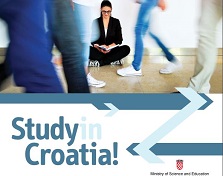For undergraduate studies, candidates’ high school grades and the results of their high school final exams or State Matura are used as the basis for the evaluation.
Higher education institutions determine the enrolment criteria which are the basis for classification and selection of candidates. For degree programmes, these usually consist of:
- Educational qualifications (type of completed education)
- Achievements from previous education (grades obtained), as well as State Matura exams for undergraduate study
- Results of additional entrance classification exams, if requested by higher education institution
- Special knowledge, skills or abilities, if requested by higher education institution.
For exchange programmes, the selection criteria are not usually based on students’ educational qualifications and grades, but on the applicants’ motivation, usually assessed through a candidate’s application form, motivation letter and an interview. The information below is therefore primarily addressed to prospective students wishing to enrol in degree programmes. Prospective students interested in exchange programmes should consult the exchange programme competition announcements at their respective universities, which have bilateral agreements with Croatian higher education institutions, as well as the section “Scholarships”, for a list of other academic exchange programmes.
Educational qualifications
Depending on the type of studies prospective students wish to undertake, the following minimal educational qualifications are necessary in order to enrol in higher education institutions in Croatia:
- Undergraduate university and professional studies: prospective students who have completed secondary education can enrol in an undergraduate study programme. Higher education institutions determine the types of secondary education that are appropriate for admission to a certain undergraduate or professional study programme. Normally, the institutions expect prospective students to have completed a minimum of 4 years of high school education.
- Graduate studies: prospective students who have completed relevant undergraduate studies can enrol in a graduate study programme. Higher education institutions determine which undergraduate studies are relevant for the enrolment into each graduate study programme, as well as the conditions for enrolment of candidates who have completed other undergraduate or graduate studies. Individuals who have completed professional studies may enrol in a graduate study programme if this is stipulated by enactments of the higher education institutions implementing that study programme. Enrolment may be conditioned by taking differential exams.
- Postgraduate studies: prospective students who have completed a relevant graduate study programme can enrol in a postgraduate study programme. Higher education institutions may stipulate additional conditions for enrolment into the postgraduate study.
Achievements from previous education
Prospective students can enrol in higher education institutions following an admissions procedure which usually involves an evaluation of candidates’ grades from their previous education.
For undergraduate studies, candidates’ high school grades and the results of their high school final exams or State Matura are used as the basis for the evaluation, while at some higher education institutions an additional entrance classification exam may also be required.
For graduate and postgraduate studies, the basis of evaluation is the completed relevant undergraduate study, the list of courses taken and the grades obtained. Additionally, selection criteria might also include the applicants’ motivation, usually assessed through a candidate’s application form, motivation letter and an interview. Please see the section “How to apply: graduate and postgraduate studies" for more details.
Institutional entrance classification examinations
As mentioned above, only some higher education institutions require applicants to pass additional entrance classification exams. Prospective students should consult the competition announcement of the study programme they wish to enrol in to check whether an entrance examination is required.
Special knowledge, skills or abilities
Some higher education institutions may require prospective students to provide evidence that they posses specific knowledge, skills or abilities. Typically, this is the case for study programmes in fine arts or performing arts. Prospective students should consult the competition announcement of the study programme they wish to enrol in to check what is precisely required by the institution.





